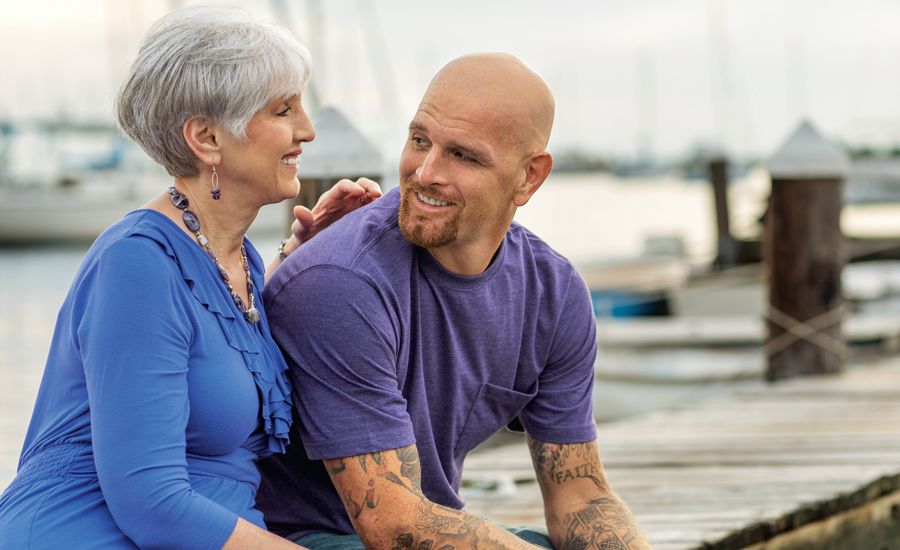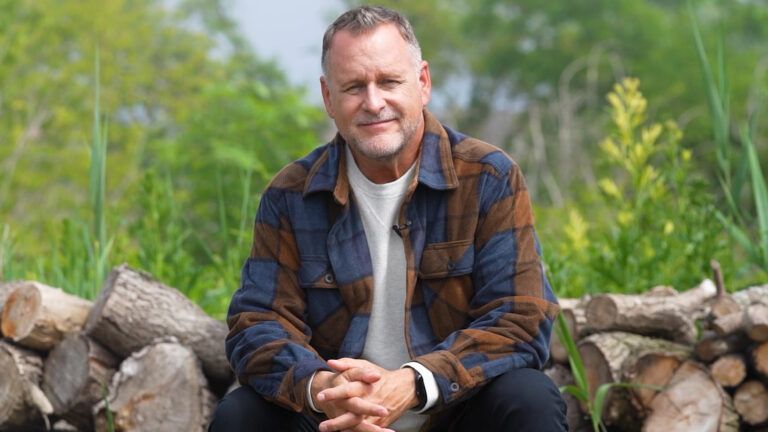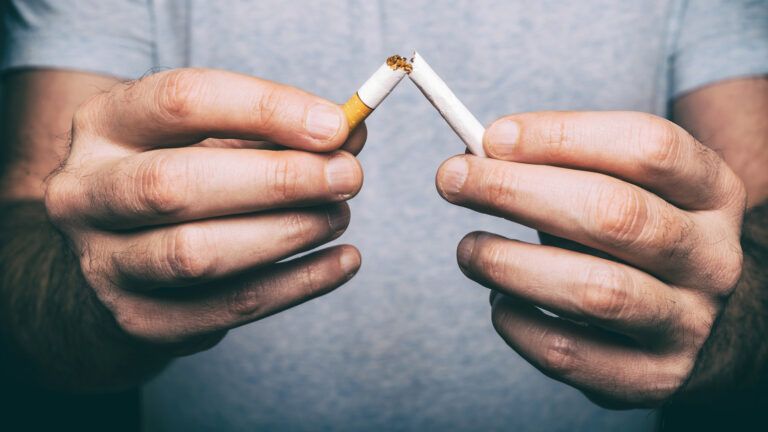I thought I could handle it. It had been a few months, and I thought I was strong enough. I walked into the break room, where someone had put out doughnuts for a coworker’s birthday. My mouth watered.
“Sharron, you came!” my coworker said. I hadn’t been going to lunch and breaks with everyone lately. It was easier to stay in my office and avoid temptation. Like that chocolate doughnut.
“I wanted to wish you a happy birthday,” I said. “I can’t stay. I quit eating sugar.”
And not for the reason she—and you—might think. I didn’t give up sweets for Lent. I wasn’t trying to lose weight or prevent diabetes. I was doing this for Josh.
Josh. The middle of my three children. My only son. How can I explain Josh? Our family hadn’t been able to for the past 18 years.
Not since he was 13, when he first used drugs. It started with marijuana. People told my husband, Danny, and me not to worry, that it was normal for a teenager to engage in risk-taking behavior, that it was a phase he’d grow out of.
That might be true for most kids. Josh was different. For him, marijuana opened a door to a whole new world. He moved on to Ecstasy, GHB, LSD.
I didn’t realize how bad things were until one Friday when he was 16, and his school called to say he’d missed four out of five days that week. He’d left the house each morning when I left for work, so I had no clue he’d been getting drunk and stoned instead of going to class.
Danny and I put him in a rehab. Going into treatment for drug and alcohol abuse at only 16! How did our son get to this place? How did we?
I searched and prayed for some explanation for Josh’s behavior. If I knew the root of the problem, I could solve it, right?
Maybe he was self-medicating for attention deficit/hyperactivity disorder. He’d been on Ritalin since first grade, and statistics show that children with ADHD are more likely to have substance-abuse issues as teens. Josh didn’t like Ritalin because it killed his appetite.
Then he discovered marijuana, which calmed his hyperactivity and gave him the munchies—perfect for a big boy who liked to eat.
Maybe Josh got into drugs because he craved approval. He wasn’t a good student, but he could drink and drug better than anyone. He became the goto guy in high school. Need something to get the party started? Call Josh. That was how he got attention from friends.
Maybe his dad and I weren’t around enough to give him the structure and supervision he needed. Danny was out of the country two weeks a month for his job. I worked full-time.
Why didn’t I ask more questions? Josh and his friends were getting high right in our house, and it was so far outside my experience—I grew up in the Bible Belt, and we didn’t even keep alcohol in our home—that I didn’t know what I was seeing. Like the crushed soda cans with holes poked in them; they were being used as dope pipes. How could I have been so naïve?
All these years later, I was no longer naïve. Not after everything Josh had put us through. An LSD overdose. Cocaine-and-downer binges. Opiate dependency. Lies. Manipulation. Denial.
Danny and I tried everything to help Josh. Treatment centers, counseling, support groups, kicking him out of the house, praying till we ran out of words. Nothing worked. Josh would maintain sobriety for a while only to relapse again.
Addiction is a disease of relapse, counselor after counselor told us. I heard it from other parents at Al-Anon and Nar-Anon meetings: “Relapse is part of recovery.”
I didn’t know if I believed that anymore. Josh was 31 now and no closer to recovery than that first time in rehab. The only thing he was closer to was death.
Josh was in a treatment center in the fall of 2009 when he was rushed to the hospital for gallbladder surgery. Afterward he was put on painkillers and relapsed.
The treatment center kicked him out, and his addiction went into overdrive. He was up to 40 pills a day. He did things he’d never done before to feed his habit, not just borrowing money from me but stealing.
I understood when his wife filed for divorce; she had to protect herself and their son. I understood when his sisters said they’d had enough. They needed to live their own lives, not try to keep Josh from destroying his.
Even I told him, “I will always love you, but I don’t have to like you. Right now, I don’t. And I don’t trust you.”
What I didn’t understand was why Josh couldn’t change. How could he choose to do what he knew was wrong? Was there more I could do to help him?
Just after the New Year, I got an urge: Give up sugar until Josh was clean and sober for 365 days in a row. An idea so weird it had to have come from God. I couldn’t have dreamed it up. But if it was what I needed to do to help my son, I would.
I started my sugar fast on January 13. I didn’t tell Josh. It was just between me and the Lord. On Valentine’s Day, the head of our office gave everyone chocolates. That little box on my desk drove me crazy until I gave it away.
Josh reentered treatment on February 18. I took that to mean God was honoring the commitment I’d made. I wrote Josh every day—a Scripture verse, something to let him know I was thinking about him.
My office turned out to be a minefield. I’d never thought about how often we had parties and sweets until I gave up sugar. No candy, no cookies, no cake, I had to remind myself.
Or doughnuts! I added now, turning my back on that chocolate temptation and hurrying out of the break room. I’d thought I was strong enough to be around sweets. Nope. Was this what it was like for Josh, going to a party and trying to stick to soda while everyone else was drinking beer?
I started bringing fresh fruit to work so I could go to celebrations and satisfy my sweet tooth. But the juiciest mangoes in the world couldn’t have saved me the day I went with my older daughter to her wedding-cake tasting.
Vanilla, lemon, chocolate…the scents were intoxicating! “Here’s the chocolate cake with almond buttercream icing,” the cake designer said.
My daughter took a bite. “Mom, try this! Come on, it’s a special occasion.” By now, she knew all about my fast.
“I can’t,” I said. “I made a promise.” But I had to clench my hands to keep from grabbing a fork and digging in. Finally I couldn’t stand it. “I need to know what we’re serving the guests,” I said. “A tiny bite this one time won’t hurt.”
“This one time…” I’d heard Josh use that justification. This slip didn’t hurt me, except my pride. But for an addict, one slip could lead to a full-blown relapse. And if I merely liked sugar and couldn’t resist a piece of cake, how hard must it be for Josh to turn down the substances he was addicted to?
That’s when I got an inkling of what my son went through on a daily basis. In my next letter, I told him about my sugar fast. How I’d broken it in a weak moment with the cake. How it had given me a peek into an addict’s life.
Josh called me from the treatment center. “Mom, you don’t know how much this means to me. Really, it’s unbelievable!”
“But I caved. I feel like a failure.”
“Mom, it’s okay. Addiction is a disease of relapse, remember?” he joked.
I thought God had urged me to give up sugar for my son. It was more for me, to help me understand his struggle. I came away with a deep respect for recovering addicts who every day choose to keep doing the next right thing.
Like my son. On February 18, 2011, Josh and I celebrated his one year of sobriety by sharing a piece of chocolate cake. A sweet victory. And even sweeter will be this February 18, when we celebrate five years.
Download your FREE ebook, True Inspirational Stories: 9 Real Life Stories of Hope & Faith.





